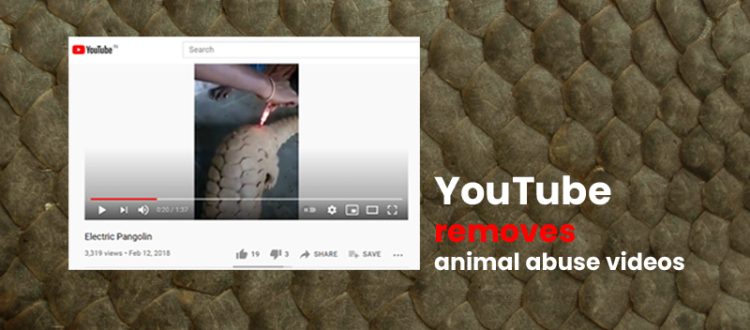WTI helps YouTube clean up content showcasing illegal wildlife trade and crime
8th December, 2021, Noida:
A big win for Wildlife Trust of India (WTI) and the overall wildlife conservation fraternity came in the form of YouTube removing content showing the illegal trade of pangolin on the video sharing platform this last week. Over the past year, the Wildlife Crime Control Division at WTI has been tracking such content and compiled a list of URL’s that was promptly responded to, by the video sharing and social media giant.
The limitlessness of social networks and the perils of it
Amidst the ongoing race towards digitization, social networks have been the center stage. Not only do social networks offer seamless content sharing and consumption but they have also created opportunities for billions of businesses and individuals across the globe. However, this limitless nature does come with its unique set of drawbacks. While, as a policy, any uploaded content is continuously moderated by these platforms, a good chunk of it does make it way through and not all of it is a productive story.
Among these “inappropriate” content lie the making of illegal online wildlife marketplace. One of such links that WTI’s team flagged showcased a pangolin being put in a highly distressful situation by bringing it in close proximity to electric wires, claiming it to be real-life “Pikachu”, an animated fictional character from a popular kid’s show. To add to the horror, the comment section of such videos was filled with keen buyers! There were numbers being exchanged and people expressing their desire to own the animal or wanting to possess the skin. Others showed harassment of the animal with individuals trying to play with it or hit its scaly exterior and even trying to inject metal into the skin using syringes. There was even a video that was titled “how to skin a pangolin?”

Content such as these had gathered more than 1.5 lakh views each and with a comment section filled with phone numbers of people looking to acquire the animal and/or its parts.
A lack of awareness or a well-thought-out crime?
Both the Indian and the Chinese subspecies of the Pangolin showcased in these videos are protected under the Schedule I of the Wildlife (Protection) Act, 1972. Consequently, the capture, hunting and possession of the animal makes one liable to the highest penalties, ranging from “imprisonment for a term which may extend up to three years or fine or with both. the law also mentions certain offences for whi9ch the imprisonment shall not be less than three years but may extent to seven years and also includes a fine which shall not be less than INR 10,000”. Both these species of pangolins are also listed as being “Critically endangered” by the IUCN Red List of Species with numbers below 5000 in the wild. The products derived from pangolins are in high demand especially from the South East Asian countries, with the baseless belief that it possesses “magic” and has healing abilities. In 2016, all 8 species of pangolins were moved from Appendix II to Appendix I at the CoP17 of CITES, completely prohibiting any international trade in pangolin and pangolin parts.
Despite this, commentaries on the videos casually give out their personal details while expressing their desire to buy the animal. Outside such online markets, pangolins already have the record of being the “most traded” wildlife species across the globe. WTI has already been a part of several investigations and seizures that have led to busting cross border trading of the pangolins in the recent past.
If apprehended, the authors of the videos can be arrested under a non-bailable warrant but given the wide lack of awareness regarding wildlife crime in the country, the discussions go on.
Translating this win into a collective battle against cyber wildlife crime
As of now, our team has been able to report 35 such video links on YouTube. A detailed report was sent to YouTube to inform them of the legal protection that the pangolin has in India while highlighting that such content can be marked under various sections defying the Wildlife Protection Act, 1972 and CITES Resolution on Conservation and Trade of Pangolins.
While we were able to bring down the videos, more are cropping up all across the internet every minute. India has currently the most active number of users for YouTube (it also happens to be the second-most visited website right after Google) with an estimate 225 million people using the site, automatically translating to 16% of the country’s population with access to videos. The numbers would be even more baffling if we add the amount of content being shared in other social media platforms like Facebook and Instagram. Also, it’s just not pangolins that are being marked for sale on the internet. Illegal wildlife and pet trade on internet also extends to several protected species of turtles, tortoises, snakes, lizards and birds (like Rose-ringed Parakeets). Hatha Jodi, a product that was marketed as a “rare plant root” but actually are severed and dried genitals of the highly-protected monitor lizards did rounds on social media and several popular e-commerce platforms till WTI exposed the trade.

At Wildlife Trust of India, our goal is to put a complete stop to any kind of illegal trade in wildlife. This is also where we need your help. Our Cyber Spotter Network is engaging citizenship participation where you can help report such objectionable content being shared on social media. It is only through a collective effort that we can hope to close down the shop and consequently, hit the trade.
To be a part of the CYBER SPOTTER NETWORK, download the Cyber HAWK mobile application from Google Play Store. You can also reach out to us at wccd@wti.org.in with details of location and the species in question, and our team will initiate immediate investigation into the matter. Let’s be proactive and raise the much needed awareness.









